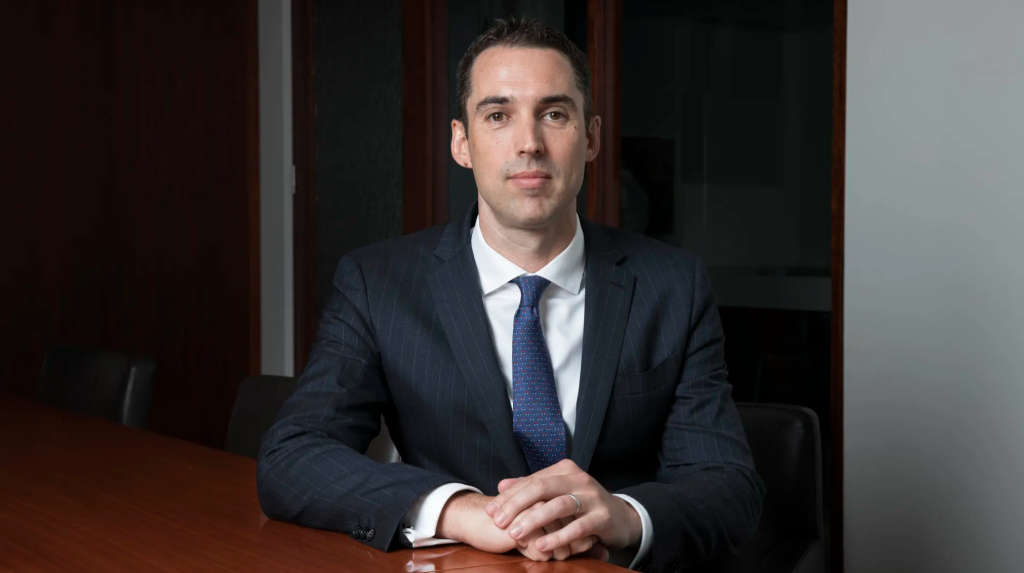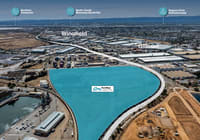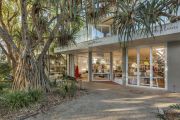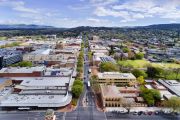
Blackstone's Tynan sets the group on a growth path
Once a week Blackstone’s local head of real estate Chris Tynan wakes up in the middle of the night, drives to the office, and gets on a video conference call to talk deals.
It’s usually 2am in Sydney but Monday morning in the US when Tynan and his team meet on Level 39 at Circular Quay’s Gateway building overlooking Sydney Harbour. They’re there to pitch their plans to Blackstone’s top brass including billionaire chief executive Stephen A. Schwarzman and president and chief operating officer Jon Gray.
“It starts at 10am New York time and that can be midnight for us in the winter, which is terrible, and and a little worse during the summer,” he says. “[But] these meetings are a hugely important part of our process.”
“And the reason that it’s fairly inflexible is because Steve [Schwarzman] and John [Gray] attend all of the investment committees during the day.”
Blackstone is one of the most closely watched firms in the US investment markets – Schwarzman, whose net worth is estimated at $US19 billion, is one of America’s most celebrated business figures (although he has recently suffered criticism for his strident support of former US president Donald Trump).
The firm has kept a low profile in Australia since setting up an outpost here a decade ago, although the size and significance of its presence, particularly in real estate, is rising.
Since Tynan joined Blackstone in 2015 to work on the drawn out takeover battle for Investa Office Fund the global real estate investor has grown its Australian property portfolio to more than $15 billion in Australia and NZ. Its headcount has grown from one employee to more than 30 and it remains one of only a handful of global real estate investors to keep a dedicated team on the ground in Australia.
The biggest chunk of its Australian operations are in real estate where its portfolio is split 20 per cent retail, 45 per cent logistics, with the remainder in office. Its logistics portfolio, which includes nine industrial estates with key tenants like Woolworths and global food packaging giant Huhtamäki, returns $150 million annual income fully leased.
Perhaps most notably, Blackstone emerged with a 10 per cent stake in James Packer’s Crown Resorts in April last year. It applied to increase that stake in October, fuelling speculation it could be interested in a broader play for the besieged casino operator.
Mr Tynan wouldn’t be drawn on the group’s intentions for Crown. But Blackstone’s investment mantra is famously ‘buy it, fix it, sell it’. And Crown may fit the bill nicely. The gaming group was last year hit by two shareholder class actions, an enforcement investigation by financial intelligence operator AUSTRAC, and a damaging inquiry led by the NSW gaming regulator.
Tynan is more forthcoming on Blackstone’s other potential targets for growth in areas such as data centres, land-rich shopping malls and even redundant office towers.
Globally, Blackstone has tracked the expansion of internet giant Amazon’s fulfilment centres, buying up logistics real estate in high growth segments. It has been a profitable exercise, and Tynan expects to see more of it in Australia. “We identified ecommerce as a growth sector and started buying up logistics assets pretty aggressively, not because we thought, it’s going to be the flavour of the month in Australia in 2020,” he says.
“But because we thought there’s a catalyst for demand [of online shopping] that we haven’t actually seen hit Australia yet. And I think that that probably is still the case. So if you’re asking whether we’re done on logistics yet? Our answer is definitely ‘No’.”
But even with the rising tide of e-commerce, he warns that once the government’s pandemic-busting JobKeeper wage subsidy and other lifelines are withdrawn next year, it will spell trouble.
“Retail has been impacted already. And COVID made it worse. I think as they wean the retail industry off those lifelines, you will see the real impact of Coronavirus and the subsequent rise in ecommerce.”
“That’s not to say that you can’t go and find good value in a shopping centre, but I think a lot of centres are going to need help. I don’t think that the distresses have truly come home to roost just yet.”
Tynan says shopping centres will survive with more tenants looking to use their stores as part showcase, part click and collect and part warehouse.
But coming into 2021, the talk of the town is whether staff will return to office towers en masse or continue to work from home, and what that means for occupancy rates.
“The Blackstone view is that Steve and John who are the CEO and COO, are huge believers that collaboration and creativity happens best when you’re together. And whilst tools like Zoom are phenomenal versus being on the phone, they aren’t the only answer,” he says.
“And so they are very encouraging of the offices getting back together when it’s safe. And when it’s practical to do so.″
“Where we’ve found ourselves most inclined to make investments in the office space, certainly in the last little while, has been trying to think of themes that are going to really drive that office take up regardless of whether people partially working from home and fully working,” he says.
“These meetings are a hugely important part of our process and global investment committee, and for real estate, the investment committee starts at 10am New York time on Monday,” Tynan, the senior managing director and the head of Real Estate Australia, says in an exclusive interview with The Sydney Morning Herald and The Age.
“And the reason that it’s fairly inflexible is because Steve and John attend all of the investment committees during the day.”
Using the Blackstone mantra of buy it, fix it and sell it, Tynan says every proposal is considered by the committee and benchmarked against global deals.
Having completed a Bachelor of Commerce and Bachelor of Law at the University of New South Wales, Tynan joined Morgan Stanley where over the course of almost 13 years he left as the managing director.
But when not at work he spends most of his time chauffeuring kids around to various sporting events. He, with wife Nancy, have three children, two girls and a boy at primary school.
“I swim next to my girls who are in regular squads when they’re not at ballet or gymnastics. On the weekends I’m doing the sport shuffle between Jujitsu, ballet, swimming all Saturday and Sundays are for family time,” he says.
Since Tynan joined Blackstone in 2015, where his first high-profile deal was working on the long takeover battle for Investa Office Fund, which eventually went to Oxford Properties, the global real estate investor has grown its Australian property portfolio to more than $15 billion in Australia and NZ. Australia accounts for the lion’s share with $12 billion of real estate assets.
Blackstone also owns La Trobe Financial and the former Valad Property group, which is now called 151 Property.
The global business is run using three investment fund principles: a more aggressive ‘opportunistic’ platform, a longer term ‘core plus’ profile, and non-bank debt lending.
The biggest chunk of its Australian operations are in focused around real estate. In general, its portfolio mix is split towards 20 per cent of retail and 45 per cent logistics, with the remainder in office and the rapidly evolving build-to-rent sector.
It has teamed up with Beck Property Group, run by property veteran Max Beck’s son, Sam, to take the next stage of its Caulfield Village project. Under the deal, Blackstone signed a fund-through for 437 apartments across seven buildings with an end value around $300 million, an investment it will hold and manage in its portfolio.
Other targets for acquisition and expansion are data centres, land-rich shopping malls and even redundant office towers.
Starting with one employee ten years ago, its Sydney office now houses a robust team of 30 employees, one of only a handful of global real estate investors keeping a dedicated team on the ground in Australia.
That team will grow amid expectations the property outlook will improve over the coming year, underpinned by a reliable vaccine and Australia’s ability to manage the pandemic’s impact.
Globally, Blackstone has tracked the expansion of internet giant Amazon’s fulfilment centres, buying up logistics real estate in high growth segments, a profitable exercise.
For Tynan, there is more growth to come, particularly in Australia. “We identified ecommerce as a growth sector and started buying up logistics assets pretty aggressively, not because we thought, it’s going to be the flavour of the month in Australia in 2020,” he says.
“But because we thought there’s a catalyst for demand [of online shopping] that we haven’t actually seen hit Australia yet. And I think that that probably is still the case. So if you’re asking whether we’re done on logistics yet? Our answer is definitely ‘No’.”
But even with the rising tide of e-commerce, he warns that once the government’s pandemic-busting JobKeeper and other lifelines are withdrawn next year, it will spell trouble.
“Retail has been impacted already. And COVID made it worse. I think as they wean the retail industry off those lifelines, you will see the real impact of Coronavirus and the subsequent rise in ecommerce.”
“That’s not to say that you can’t go and find good value in a shopping centre, but I think a lot of centres are going to need help. I don’t think that the distresses have truly come home to roost just yet.”
Tynan says shopping centres will survive with more tenants looking to use their stores as part showcase, part click and collect and part warehouse.
But coming into 2021, the talk of the town is the impact on the office market and whether staff will return to work and what that means for occupancy.
“The Blackstone view is that Steve and John who are the CEO and COO, are huge believers that collaboration and creativity happens best when you’re together. And whilst tools like zoom are phenomenal versus being on the phone, they aren’t the only answer,” he says.
“And so they are very encouraging of the offices getting back together when it’s safe. And when it’s practical to do so.”
He says from the Blackstone real estate view, there is a range of different tenants with different outcomes that they’re talking about with respect to 2021.
“Where we’ve found ourselves most inclined to make investments in the office space, certainly in the last little while, has been trying to think of themes that are going to really drive that office take up regardless of whether people partially working from home and fully working,” he says.
“Time will tell when we enter 2021.”











